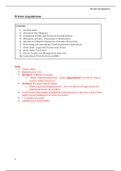Exam (elaborations)
Private Acquisitions (PA) LPC Notes - 2018/19: Distinction
- Module
- Private Acquisitions
Distinction level Private Acquisitions notes for the BPP LPC course. These comprehensive notes are based on the SGS activities, solutions, SGS slides and chapter handouts. I've also included some helpful exam tips given to me by my tutor as well as a few possible exam questions/topics that are like...
[Show more]



